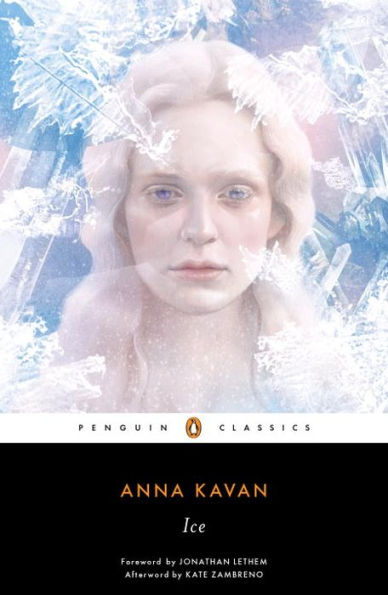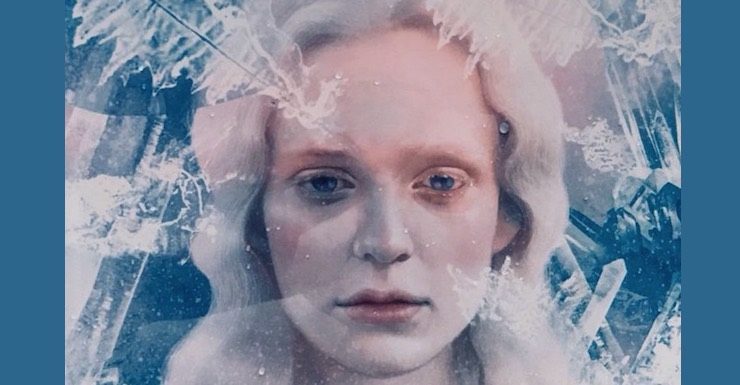Anna Kavan’s Ice is off like a shot from the first sentence, “I was lost, it was already dusk, I had been driving for hours and was practically out of petrol.” This haunting novel was one of Anna Kavan’s last works, after an early career writing in a more realistic vein, and a mid-career exploration of insanity and power through experimental fiction. Ice was described as “The Avengers meets Kafka” and I think that sums it up quite nicely—it’s a terrifying work of speculative fiction that could be post-apocalyptic from one angle, and allegorical from another.
Buy the Book


Ice
We are in an unnamed country, traveling down and icy road in the dark. We soon learn that our narrator (he will never have a name) is searching for a girl he once “loved” (she also remains unnamed) who is now married to an overbearing, possibly abusive man. The girl is described at various points as little more than a girl, as an abuse survivor, as petulant, bruised, and deathly pale. Her hair is so blond it begins to appear as white and even silver. She only gets a few lines of dialogue across the entire book, and nearly all of them are variants on “No” “Don’t!” and “How can you be such a monster?”
The narrator seems to be some sort of military official/academic, who turns out to be adept at working with different military factions, but who most recently spent time studying singing lemurs on a tropical island. This detail becomes important because not only do the lemurs represent the only pure and carefree emotion in the book, but more importantly the entire world is being gradually crushed by an enormous ice sheet, and the narrator looks back on his time on the island like a lost Eden.
So why has he returned to an unnamed continent that seems like a slowly freezing Europe? He has been impelled by his concern for “the girl”…or so we think at the beginning. It soon becomes clear that his “concern” is more like obsession, and that the girl may be many girls whom he just fixates on and chases down, one by one. It also becomes clear that on a certain level the individual girl doesn’t matter—she is every girl. Every fragile creature whose life was controlled and bounded by the whims of men, every girl ever thrown into a volcano or sucked by a vampire or sacrificed to a dragon or forced into a BDSM dungeon. The narrator isn’t a hero—except in his own head—he’s a classic white knight archetype, rushing in where he isn’t wanted to force the girl to agree with his own ideas of what she needs.
This alone would be bad enough, but as the book goes along the girl is kept by either her distant, controlling husband or a character known only as The Warden, who runs a small village in an undeveloped country before working his way up onto the national stage through war profiteering. The narrator runs into him repeatedly, vying for control of the the girl, but also seemingly attracted to the man himself, and also occasionally swapping and/or merging identities with him. Sometimes he sees the Warden escape some catastrophe with the girl, sometimes he sees him brutalize her, and sometimes he sees him abandon her.
If this all seems vague it’s because our narrator also has frequent hallucinations. He sees the girl posing nude for paintings,with cords wrapped around her wrists and ankles to hold her in place. He sees her surrounded and consumed by ice. He sees her abducted by torch-wielding villagers and thrown into the sea. He sees her locked in a bedroom, the Warden brandishing the key to her door like a weapon.
The girl could be an allegory—many people see her as a symbol for Kavan’s heroin addiction. The imagery of a fragile girl imprisoned and forced to move from castle to castle across a white wilderness is a neat metaphor for Kavan’s time in and out of mental hospitals. But personally I see a different story. Here we have a woman obliterated through objectification. Not even the text gives her a name, or any dialogue other than protests. We see the entire story through the male narrator’s point of view. He’s the action hero, accomplishing things, infiltrating secret societies, getting in street brawls, and making war, all while the girl lies in bed reading paperbacks, or stands fretfully on the bows of ships, staring at the storm-toss’t sea. I see a story about stories, about who gets to be a hero, and how a man striding around the world, blindly flattening everything in his path and never examining his own motivations or the consequences of his actions, can wreak utter havoc.
What it reminded me of most was Mary Shelley’s Frankenstein. What is our original sci-fi horror story but the tale of a man forced to deal with the consequences of sex? He gives birth to a creature, decides it’s inconvenient, and spends years running from it as it follows him everywhere, and the whole story ends in a barren icy world bereft of warmth or life. Here the man wants something without even knowing why, in this case a girl who is never allowed to show personality or will of her own. He pursues her relentlessly, and all the while the ice pursues him, sliding silently across land and sea, promising death, nulling all of his plans and vitality, an object that he cannot control, cannot dominate, cannot fuck.
The inner torment of the man and the utter crushing of the girl are both personified in the ice, inexorably glaciers that are destroying helpless human civilizations. But here again, even the ice might be a hallucination. At various points the man comes to frozen towns looking for the girl, only to see them as vibrant and colorful as he leaves. One town still has theaters, cinemas, parades, all the comforts of civilization, but when he returns to it looking for the girl every building is abandoned, and walls of ice crunch inexorably in from the horizon. Of course this is also a tale in which the inner pain is made external, even environmental. The ice sheet has been caused by a nuclear explosion. It is the earth rejecting humanity after years of abuse, which in turn causes man to war continuously. Our narrator is a military man with a sharp sense of class and status. He earns his living being willing to kill, and is deeply invested in the structures men use to divide each other and create hierarchies. The girl is there to be acted upon to cry and pout, and to, in the end, become dependent on each of her abusers.
Anna Kavan’s own life was one long example of struggling in the face of adversity. She was born Helen Emily Woods to wealthy parents who ignored her. Her father died young, and then her mother forced her into a marriage with an older man rather than allowing her to go to Oxford. She divorced, remarried, divorced again, and along the way wrote two novels starring a protagonist named Anna Kavan. She began writing books under that name in 1940, eventually having her name legally changed. She traveled the world during World War II, a difficult and often terrifying experience that was largely refracted in Ice. Some time before the war she was introduced to heroin, and spent the rest of her life either using or trying to kick. She also lived with mental illness, was in and out of sanatoriums, and two of her three children died young—one in infancy, and the other during the War. Her writing went from realistic to boldly experimental, and often circled around madness and themes that would now be seen as “proto-feminist,” but while her books won her friends and admirers including Brian Aldiss, J.G. Ballard, Anaïs Nin, and Jean Rhys, they were largely ignored by the public until Ice became a surprise hit—barely a year before her death from a heart attack at 67.
She has a unique understanding of compulsion and dependency; if someone is trapped in her story they will never find a way out. In Ice the way she writes about the helplessness of both of her main characters left me queasy. This was not an easy book, and I wouldn’t call it fun, but it is stunning and I think a great addition to any TBR stack beside Yuknavitch, Le Guin, or Ballard.
Leah Schnelbach knows that as soon as this TBR Stack is defeated, another will rise in its place. Come give her reading suggestions on Twitter!










